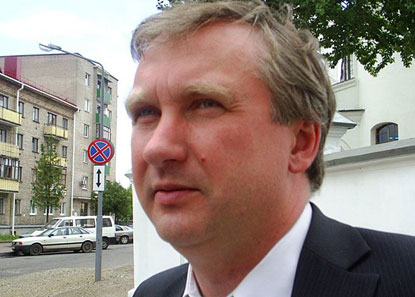Pavel Sapelka: Interior Ministry arbitrarily, without sufficient justification, reduces the already limited rights of prisoners
Prison censors did not allow Yauhen Vaskovich inquire about the possibility of distance learning at European Humanitarian University.
In his correspondence with the HRC “Viasna” Yauhen wrote that he was considering the idea of distance education at YSU. In response, together with a handwritten letter he was sent several pages of printed text with the rules of admission and training in this institution, including the tuition fees, the registration procedure, the procedure for admission, attestation and other. The enveloped was returned to the sender, sealed with tape, marked "B. Not allowed. See. the Inside".
The situation is commented by the lawyer Pavel Sapelka:
"In accordance with the Standard Minimum Rules for the Treatment of Prisoners, adopted 60 years ago, the authorities need to start thinking about the future of the prisoner after his release already when placing him in prison. Therefore, the prisoner should be encouraged to maintain and strengthen his relationship with individuals and institutions outside the prison, which will contribute to its inclusion into social life after release.
The news about the political prisoner has exposed two problems that make the life prisoners even more difficult and gray.
First, the arbitrariness of the administration of the correctional facilities when dealing with issues related to the receipt of letters, books and other literature: on the one hand, there is a general rule that according to the procedure established by the Criminal Executive Code prisoners have the right to receive parcels, packages, parcels and small packets, money transfers, conduct correspondence and telephone conversations, as well as send parcels, packets, small packets to close relatives and, with the permission of the correctional institution administration, to others. Parcels, packages, and small packets that are not received from close relatives, are handed over to prisoners on the permission of the head of the correctional institution. On the other hand, the allowed items and their number are listed in the internal regulations of correctional institutions, approved by the Ministry of Interior. Keeping money, securities and other valuables, as well as the items not mentioned in the list are not allowed. Thus, the Interior Ministry arbitrarily, without sufficient justification, reduces the already limited rights of prisoners.
The Code provides that persons sentenced to imprisonment are allowed to receive and send letters without limiting their number. Sending letters and telegrams is done at the expense of the convicted. The correspondence that is received and sent by convicts is subject to censorship, except for the correspondence sent to regulatory authorities. There are no legal provisions that would allow to limit this right, that's why all additional restrictions imposed on prisoners with reference to the internal regulations are illegal. As a general principle, censorship should serve the interests of security and prevent illegal activity.
Prisoners can study at th educational institutions providing specialized secondary and higher education if the educataion is organized in the territory of correctional institutions.
Basic, general secondary, specialized secondary and higher education of prisoners and the establishment, reorganization and liquidation of educational institutions in the territory of correctional institutions are carried out in the manner prescribed by the laws of the Republic of Belarus.
Pavel Sapelka for www.palitviazni.info


















